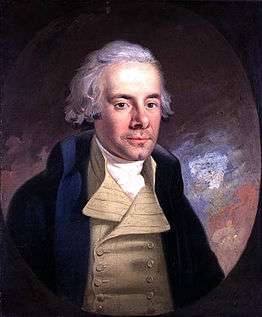Wilberforce Institute for the Study of Slavery and Emancipation
The Wilberforce Institute for the study of Slavery and Emancipation is a research institute at the University of Hull. Housed in the Grade II listed Oriel Chambers in the Hull City Centre since 2005 it seeks to research slavery in the past and the present.
History of the Institute

The Wilberforce Institute for the Study of Slavery and Emancipation, located in Kingston upon Hull, England, was officially opened in 2006, to act as a research centre for academics in conjunction with the University of Hull. The patron of the institute is anti-apartheid figure Archbishop Desmond Tutu and the institute was opened by former President of Ghana, John Agyekum Kufuor.[1] Funding was drawn through the European Regional Development Fund, Yorkshire Forward, and the Heritage Lottery Fund. The institute was opened in advance of celebrations marking the bicentenary of the Slave Trade Act 1807 which, through former Member of Parliament and major abolitionist movement figure William Wilberforce, the city of Hull has strong links to.[2] The institute is one of the leading centres specialising in researching the history of slavery, whilst also serving as a research hub concerning contemporary slavery and human rights abuses in the present age. It also aims to foster links with other universities worldwide, including prestigious American institutions such as Yale, Harvard and Stanford. It's exhibitions profile the city's links with Africa, and especially to the city of Freetown, Sierra Leone.[3] As part of the University of Hull, the institute often holds public lectures on the subject of both historical and contemporary slavery, including the annual Alderman Sydney Smith lecture,[4] so named after the former Labour MP for Kingston upon Hull South West, Sydney Smith. The institute itself is housed in the historic Oriel Chambers building, next to the historical house of William Wilberforce himself.
In 2014, the institute was a part of 'the Long Walk to Freedom', a series of artworks within the historic Old Town area of Hull, as part of the annual Freedom Festival.[5] In 2015 it was announced that the institute had been awarded the Queen's Anniversary Prize for Further and Higher Education for its 'research applied in combating modern forms of slavery'.
WISE Humanitarian Wall
The WISE 'Humanitarian Wall' commemorates important figures, both historical and contemporary, from the struggle against slavery
Described as 'a unique tribute to many of the famous names throughout history which are synonymous with the fight for emancipation and freedom', the Wall displays the names of:
Aung San Suu Kyi (1945–)
Steve Biko (1946–77)
Dietrich Bonhoeffer (1906–45)
Thomas Clarkson (1760–1846)
Frederick Douglass (1818–95)

William Edward Burghardt Du Bois (1868–1963)
Olaudah Equiano (1745–97)
Mahatma Gandhi (1869–1948)
Toussaint L'Ouverture (c. 1743 – 1803)
Martin Luther King (1929–68)
Abraham Lincoln (1809–1865)
Nelson Mandela (1918–2014)
Jose Marti (1853–95)
Edmund Dene Morel (1873–1924)
Tom Paine (1737–1809)
Sylvia Pankhurst (1882–1960)
Rosa Parks (1913–2005)
Granville Sharp (1735–1813)
Harriet Beecher Stowe (1811–1896)
Hariet Tubman (1820–1913)
Desmond Tutu (1931–)
Raoul Wallenberg (1912–47)
William Wilberforce (1759–1833)
The wall faces Mandela Gardens that were opened in May 1983 by Sir Shridath Ramphal. The gardens were named after the anti-Apartheid prisoner Nelson Mandela who later served as President of South Africa.
The US Ambassador to the United Kingdom, Matthew Barzun, was recently photographed paying his respects at the wall during a tour of Hull in early 2015, also commenting that "Wilberforce is a name known around the world and I am sure it is something Hull can use in promoting the city during 2017".[6] In 2017, the city will take up the mantle of the UK City of Culture.[7]
References
- ↑ Johnston, Chris. "Slavery research centre opens at Hull". the Guardian. Retrieved 16 December 2015.
- ↑ "Hull case study". www.understandingslavery.com. Retrieved 16 December 2015.
- ↑ "Hull case study". www.understandingslavery.com. Retrieved 16 December 2015.
- ↑ "Alderman Sydney Smith Lecture – University of Hull". www2.hull.ac.uk. Retrieved 16 December 2015.
- ↑ "Freedom Festival". www.freedomfestival.co.uk. Retrieved 16 December 2015.
- ↑ "US Ambassador Matthew Barzun 'falls in love' with Hull". Hull Daily Mail. Retrieved 16 December 2015.
- ↑ "Hull – City of Culture". www.visithullandeastyorkshire.com. Retrieved 16 December 2015.